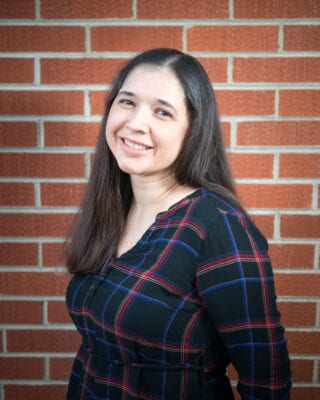2021 SIS Best Paper Award: Jesse Morris
 Jesse Morris has been simultaneously working in a data management position at Oak Ridge National Lab while taking classes in the MSIS program for the last four years. One of the benefits of this has been aligning class projects with work she’s doing at her job. That’s the case for the paper she wrote that won the 2021 SIS Best Paper Award, “GIS for Knowledge Management: Leveraging mapping tools to address baby boomer ‘brain drain”.”
Jesse Morris has been simultaneously working in a data management position at Oak Ridge National Lab while taking classes in the MSIS program for the last four years. One of the benefits of this has been aligning class projects with work she’s doing at her job. That’s the case for the paper she wrote that won the 2021 SIS Best Paper Award, “GIS for Knowledge Management: Leveraging mapping tools to address baby boomer ‘brain drain”.”
This paper, and some of her other projects, were inspired by a reoccurring issue within her department, which tests water samples throughout the area.
“There is a cohort of people who are retiring and taking really rich experience of information as they go out the door, and a lot of them end up coming back as consultants, so I’ve done a handful of projects throughout the program focused on knowledge management because I was interested in that,” she said.
In this paper, she meshed together Geographic Information System mapping with knowledge management, taking cues from a type of system called community mapping. This is a methodology where information from local communities, typically native populations, is gathered and used to create maps. For example, there was a project in Canada collecting information about fisheries and using native knowledge to help pinpoint areas.
“It’s about empowering communities. I ran across it and thought, this is what we’re really getting at except we’re talking about workers, what they know about water drainage, where we sample,” she said.
The paper addresses how she would like to capture spatial knowledge from people prior to them leaving the department, combining knowledge management tools such as interviews, surveys and shadowing with GIS stories. The end result of the project would be maps with photos and narratives from long-serving employees.
This has proven to be an especially relevant topic as many people ended up being in and out of the office on quarantine throughout the last year due to the COVID-19 pandemic, Morris said. When one employee suddenly had to be out for two weeks to quarantine, others needed to pick up their work, and the knowledge about where they needed to go wasn’t always readily available.
Morris said she’s looking forward to turning this paper into a real project, and that she’s grateful for the award it earned.
“I was really excited, I worked really hard on this paper, and it was really gratifying that I could use it for work and for the committee to recognize how much work went into it,” she said.